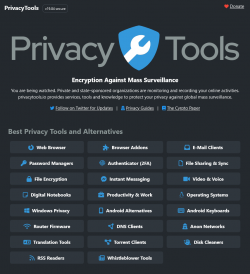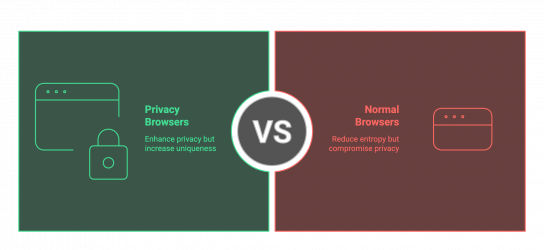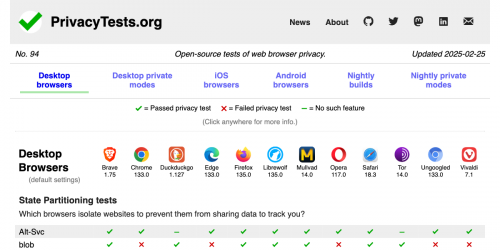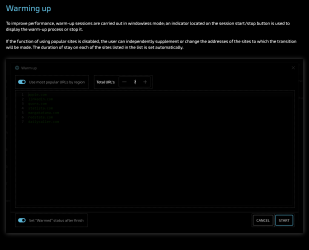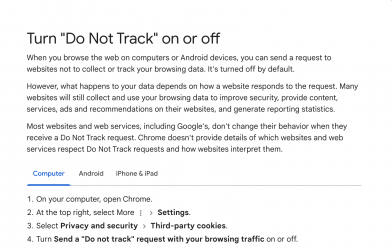
There's a weird misconception floating around among newbie carders that because fraud and hacking are cousins, the tools must be too. You think using some edgy-ass privacy browser or hacker OS makes you look like a pro? Nah, it makes you look like a clown. Let's break down exactly why these "privacy" tools are fucking up your hits and making you stand out even more.
Privacy Isn't For Fraud
First off, let's clear something up: privacy isn't for fraud. Privacy extensions and browsers are built to stop advertisers from tracking your embarrassing search history—great if you're paranoid about Google knowing your hemorrhoid cream preferences, but completely counterproductive when it comes to doing fraud.
See, your goal isn't to dodge ads—it's to blend in. You want to look exactly like every other boring-ass normie shopping online. Privacy tools, ironically, do the exact opposite—they fortify your session so much that you stick out more, leading to more cancellations.
Entropy
Entropy is just a fancy-ass word for uniqueness. The more unique your browser fingerprint is, the easier it is for antifraud systems to spot your ass. Privacy browsers crank your entropy through the roof by blocking scripts, cookies, and trackers that normal browsers happily accept. What this simply means is that by focusing on privacy, youre losing the ability to blend in properly, something needed if you want sites to trust you.
Privacy Browsers
Privacy browsers with strict settings and extensions are built to keep Big Tech out of your business. They block trackers, reject cookies, and generally tell the internet to fuck off when it comes to surveillance.
You might think it's perfect for fraud and you'd be dead wrong: these browsers optimize for anonymity, but fraud requires the opposite—you need to look trustworthy and boringly normal. Every privacy feature that protects you from surveillance makes you absolute dogshit for carding.
Third-party Cookies
One great example of this are third-party cookies. These are tiny string sites save in your machine to track you across different domains. it's also one of the ways websites know you're a legit customer. Normal browsers accept these cookies without bitching about it. Privacy browsers block them by default. You might think you're being slick, but all you're doing is telling the site, "Hey, I'm not like the other shoppers—I'm special." And guess what? Special gets flagged. Special gets declined. Special gets you zero hits.
Third-party cookies are what makes warming a session actually work. When you're warming up a session, those cookies are tracking your behavior across different parts of the site and building a profile that says "this person is legit."
If you're using some strict, privacy-centric browser that blocks these cookies, warming your session by manually browsing different sites is completely worthless. You're essentially starting cold every single time, which is exactly what antifraud systems are designed to catch.
Do Not Track & JS/FP Blocking
"Do Not Track" (DNT) sounds great in theory—who doesn't want to tell trackers to fuck off? But normal browsers don't have DNT enabled by default. So when your privacy browser proudly announces "DO NOT TRACK ME," antifraud systems immediately think, "Hmm, this asshole is hiding something."
Even worse, privacy browsers often fuck with JavaScript and fingerprinting techniques. They randomize canvas, rects, WebGL, and other fingerprinting values, sometimes changing them every session. You think you're being clever, but all you're doing is making the site suspicious of you.
Hacking OSes, RDPs, and VMs:
These include, but not limited to, those edgy-ass hacking OSes like Kali Linux, Parrot OS, or Qubes/Whonix. Sure, they look cool in screenshots, but they are pretty uch useless for carding. Normal shoppers don't use hacking/privacy OSes to buy sneakers, so anyone detected to use it are instantly suspect.
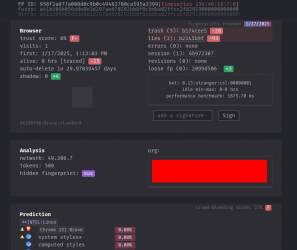
Blend In or Get Fucked
Look, I get it—privacy browsers and hacking OSes seem badass. But carding isn't about looking cool; it's about looking boring. Your goal is to blend in with the herd, not stand out like some weirdo. Stick to mainstream antidetects or iPhones, tweak your setup to look as vanilla as possible, and stop sabotaging your own hits.
Remember: the best fraudsters aren't the ones who look like hackers—they're the ones who look like your grandma shopping for cat food. d0ctrine out.
Last edited by a moderator:





